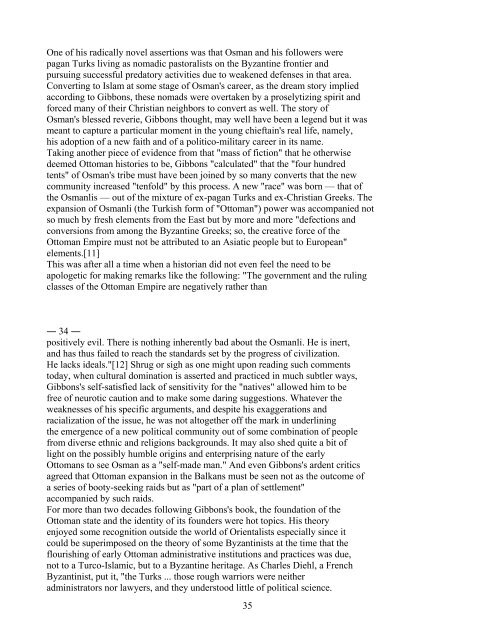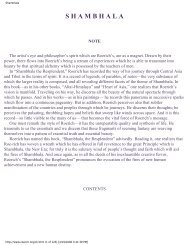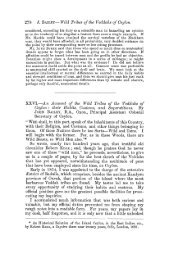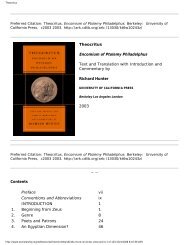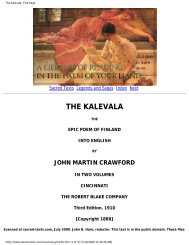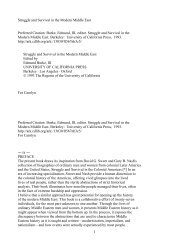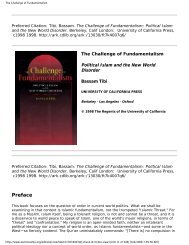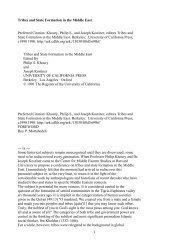Between Two Worlds Kafadar.pdf
Between Two Worlds Kafadar.pdf
Between Two Worlds Kafadar.pdf
You also want an ePaper? Increase the reach of your titles
YUMPU automatically turns print PDFs into web optimized ePapers that Google loves.
One of his radically novel assertions was that Osman and his followers were<br />
pagan Turks living as nomadic pastoralists on the Byzantine frontier and<br />
pursuing successful predatory activities due to weakened defenses in that area.<br />
Converting to Islam at some stage of Osman's career, as the dream story implied<br />
according to Gibbons, these nomads were overtaken by a proselytizing spirit and<br />
forced many of their Christian neighbors to convert as well. The story of<br />
Osman's blessed reverie, Gibbons thought, may well have been a legend but it was<br />
meant to capture a particular moment in the young chieftain's real life, namely,<br />
his adoption of a new faith and of a politico-military career in its name.<br />
Taking another piece of evidence from that "mass of fiction" that he otherwise<br />
deemed Ottoman histories to be, Gibbons "calculated" that the "four hundred<br />
tents" of Osman's tribe must have been joined by so many converts that the new<br />
community increased "tenfold" by this process. A new "race" was born — that of<br />
the Osmanlis — out of the mixture of ex-pagan Turks and ex-Christian Greeks. The<br />
expansion of Osmanli (the Turkish form of "Ottoman") power was accompanied not<br />
so much by fresh elements from the East but by more and more "defections and<br />
conversions from among the Byzantine Greeks; so, the creative force of the<br />
Ottoman Empire must not be attributed to an Asiatic people but to European"<br />
elements.[11]<br />
This was after all a time when a historian did not even feel the need to be<br />
apologetic for making remarks like the following: "The government and the ruling<br />
classes of the Ottoman Empire are negatively rather than<br />
― 34 ―<br />
positively evil. There is nothing inherently bad about the Osmanli. He is inert,<br />
and has thus failed to reach the standards set by the progress of civilization.<br />
He lacks ideals."[12] Shrug or sigh as one might upon reading such comments<br />
today, when cultural domination is asserted and practiced in much subtler ways,<br />
Gibbons's self-satisfied lack of sensitivity for the "natives" allowed him to be<br />
free of neurotic caution and to make some daring suggestions. Whatever the<br />
weaknesses of his specific arguments, and despite his exaggerations and<br />
racialization of the issue, he was not altogether off the mark in underlining<br />
the emergence of a new political community out of some combination of people<br />
from diverse ethnic and religions backgrounds. It may also shed quite a bit of<br />
light on the possibly humble origins and enterprising nature of the early<br />
Ottomans to see Osman as a "self-made man." And even Gibbons's ardent critics<br />
agreed that Ottoman expansion in the Balkans must be seen not as the outcome of<br />
a series of booty-seeking raids but as "part of a plan of settlement"<br />
accompanied by such raids.<br />
For more than two decades following Gibbons's book, the foundation of the<br />
Ottoman state and the identity of its founders were hot topics. His theory<br />
enjoyed some recognition outside the world of Orientalists especially since it<br />
could be superimposed on the theory of some Byzantinists at the time that the<br />
flourishing of early Ottoman administrative institutions and practices was due,<br />
not to a Turco-Islamic, but to a Byzantine heritage. As Charles Diehl, a French<br />
Byzantinist, put it, "the Turks ... those rough warriors were neither<br />
administrators nor lawyers, and they understood little of political science.<br />
35


